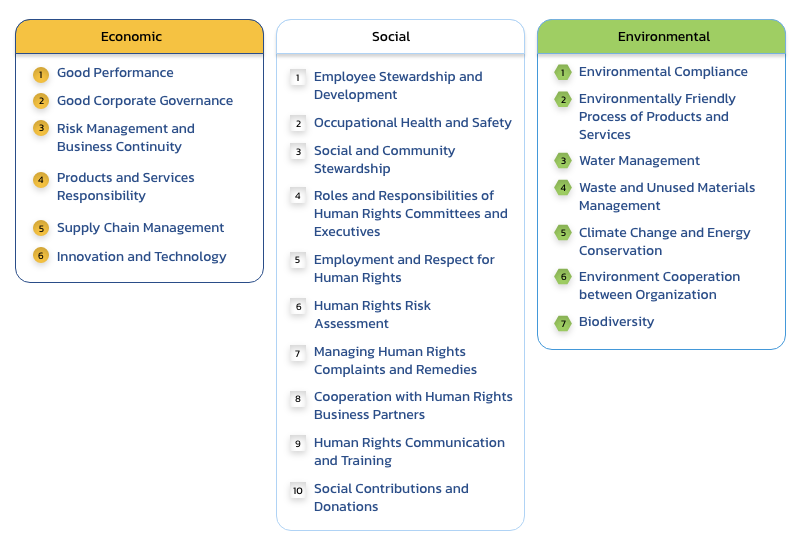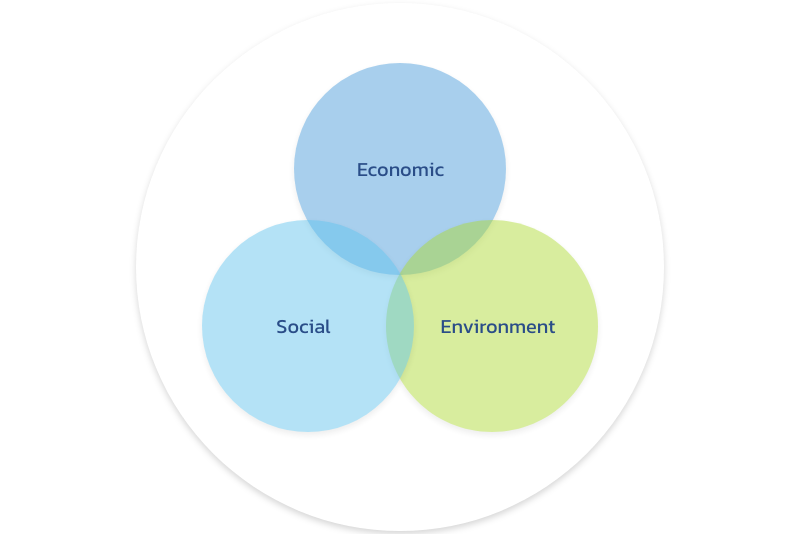The company conducts its business with a sustainable participation approach, responding to the needs and expectations of stakeholders while creating value for society and the environment. It undergoes an annual review and development of key sustainability issues to align with national and global sustainability perspectives. These issues are identified through a selection process involving stakeholders and external experts, adhering to international reporting standards such as the Global Reporting Initiative (GRI Standard 2021).
Process for Assessing Sustainability Issues
1. Analysis of Sustainability Issues:
The company conducts a comprehensive analysis of sustainability issues throughout its value chain, covering operations from raw material sourcing, production, and delivery to the use of products and services. This analysis addresses sustainability concerns within the relevant industry.
- Stakeholder Prioritized Issues:
- Key ESG issues in the industries relevant to the company are analyzed by leading assessors such as S&P Global and SET ESG Rating.
- Key issues derived from satisfaction surveys conducted before organizing activities/projects.
- Feedback gathering platform.
- Company Prioritized Issues:
- Issues significantly impacting the company as assessed by the organizational risk management evaluation.
- Issues that the Sustainability Development Committee prioritizes and regularly monitors closely.
- Areas that the company needs to improve and develop through satisfaction surveys and evaluations aligned with the company's ethical standards.
2. Issue Identification.
The company establishes sustainability issues that are crucial to its business operations and significant to stakeholders. This consideration takes into account the current situation, encompassing new issues that may arise and adjusting the prioritization of relevant issues.
3. Priority Assessment
The company prioritizes sustainability issues based on the results of surveys assessing expectations from stakeholders, integrating them with the company's expectations. These cover economic, social, and environmental dimensions that may be impacted by the company's operations, categorized into high, medium, and low levels, totaling 23 issues.
4. Review and Certification of Assessment Results
In the year 2023, the company conducted a review of sustainability issues, omitting one issue: "Managing Crisis from the COVID-19 Situation," due to the continuous decline in its impact. There remain 23 sustainability issues to report in the year 2024, aligning with the 15 Sustainable Development Goals (SDGs) of the United Nations.
The company presents the 23 sustainability issues to the Sustainability Development Committee/Management for acknowledgment of the assessment results. These issues will be formalized as organizational sustainability priorities in the Sustainability Development Report for the year 2023.


Guidelines for sustainable development

Economic the company operates to achieve its vision and mission based on stakeholder satisfaction and maximizing benefits. (This involves 6 key issues)
Social the company conducts business ethically, taking responsibility for and caring for communities and society both within and outside the service area. (This involves 10 key issues.)
Environmental the company is committed to environmental care within the production process, valuing resource efficiency, conservation of natural resources, and sustaining a balanced and sustainable environmental system. (This involves 7 key issues)